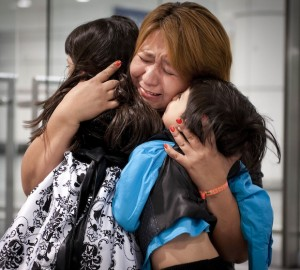 By Erin Siegal McIntyre, Fronteras
By Erin Siegal McIntyre, Fronteras
TIJUANA, MEXICO – In 2011, some 1500 children in southern California were removed from detained or deported parents, and placed in state care. That’s according to an investigation by the Applied Research Center, a think-tank specializing in race issues. They projected that between 2012 and 2014, 15,000 more kids could face a similar fate.
It’s three in the afternoon, and I meet Israel Soriano in downtown Tijuana. He arrives with his little sister in tow—she’s 14 and on spring break, visiting from Southern California.
Soriano is tall and friendly, with an easy smile. He’s still new to Tijuana, and is still trying to adjust to life in Mexico. He grew up in Orange County, California, after his mother brought him to the United States as a baby.
ISRAEL SORIANO: “I didn’t even realize I was an immigrant until I was like 14 years old.”
Soriano was deported two years ago, at age 25, after a drug arrest.
SORIANO: “I was in a nightclub with ecstasy pills and they arrested me…The thing is that I had never been to jail. I am also a father, so … they were telling me that if I didn’t come out of jail, that they were going to adopt my son, if I didn’t fight for him and all that.”
Soriano says he pled guilty because he thought he’d be released from jail faster. He didn’t think his plea had immigration consequences. But it did: permanent, mandatory deportation, with no right to counsel or appeal. His 2-year-old son is now with a foster family in California while Soriano tries to prove to the state that he’s fit to parent.
SORIANO: “The social worker told me listen, if you really want your son, here’s what you have to do, you need to get on it now because your son is young, he’s beautiful, anyone would fall in love with him…”
For children who become wards of the state, reuniting with a parent can be difficult. That’s true for anybody, but detained or deported immigrants sometimes face huge barriers. Because of a general processing backlog, immigrants can be kept in detention for long amounts of time. That means parental rights can be terminated before a parent has a chance to be released to or prove that they’re fit to regain custody.
CANDI MAYES: “It’s a constant difficulty trying to get all the systems to work together.”
Candi Mayes is the director of the nonprofit Dependency Legal Group in San Diego. I met her in a San Diego coffee shop. Her team of lawyers is contracted to represent dependent children—that is, kids without legal custodians. Mayes says that immigration policies and child welfare policies don’t work well together—in fact, the timeframes sometimes clash.
CANDI MAYES: “They don’t align at all actually. The federal procedures operate within their own timelines and they have different priorities… ”
Worse, it can be hard to locate parents who’ve been detained or deported.
MAYES: “Some of these detention facilities are not easily accessible, they might be remotely located sometimes they’re sent out of state into other facilities… just knowing that everybody is ok is a huge deal, it can take ten days for anybody to get that information. That’s a long time to go without knowing if your kids are ok.”
Reunification attempts are made even more difficult when a crime is involved, which is often the case. Those deported under a felony or aggravated felony conviction are banned from the U.S. for life. That means deported parents deal with someone like Janet Barragán.
BARRAGÁN: “We explain all the options, we help them navigate…”
Barragán is the international liason for the county of San Diego’s child welfare agency.
BARRAGÁN: “Most of them stay in Tijuana although they are from the interior they stay in Tijuana, so we help them navigate and access those systems in Tijuana.”
So how many families are face these kinds of separations? The numbers are hard to come by. What we do know is that between the end of 2010, and the last quarter of 2012, over 12,000 immigrant parents of American kids in Southern California were deported. Israel Soriano says he’s been trying to gain custody of his son since last May. In Tijuana, he’s taking the required parenting classes and also gets drug tested twice a month.
SORIANO: “I know that it’s going to be hard, but I’m going to raise him where I need to raise him, I’m going to raise him properly and show him love. I will find a way, but I am keeping my son and I’m making it work….”
Two new bills in California the Call for Kids Act and the Reuniting Immigrant Families Act, aim to help separated families, by mandating phone calls for detainees and by giving child welfare more time to reunite parents and kids.
This report was produced and reported by Erin Siegal, Joel Medina, and Beth Caldwell, and was funded by a grant from the Soros Foundation.




